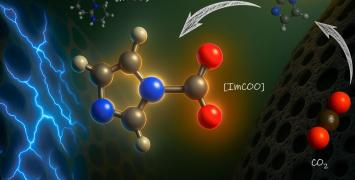Turning carbon dioxide waste into carbon building blocks
By creating a conversion process for recycling carbon dioxide into feedstock, the CO2Recycling project is paving the way towards a sustainable chemical industry.

Not only are fossil fuels a finite resource, their use often emits the carbon dioxide (CO2) gasses that cause climate change. Both these factors create new challenges for the organic chemistry industry, which depends on fossil fuels as material for their industrial processes. Although CO2 can be recycled as a carbon building block to produce organic chemicals, as a waste product, CO2 is thermodynamically and kinetically difficult to transform.
Before CO2 recycling can be used as raw material – or feedstock – an easy-to-use conversion process must be developed, which is exactly what the EU-funded CO2Recycling (A Diagonal Approach to CO2 Recycling to Fine Chemicals) project has done. Leveraging the so-called ‘diagonal approach’, the project designed novel catalytic transformations where CO2 is reacted in just a single step. Using a functionalising reagent (a substance or compound added to a system to cause a chemical reaction) and a reductant that can be independently modified, the process can produce a large spectrum of molecules.
“The CO2Recycling process enables the use of CO2 for the synthesis of amines, esters and amides – all of which were previously derived from fossil fuels,” explains Thibault Cantat, CO2Recycling project coordinator. “These materials can then be used as feedstock for the production of such important molecules as methylamines, acrylamide, and methyladipic acid.
Understanding CO2 transformation
Using molecular catalysts to activate CO2 and/or suitable reductants (hydrosilanes, hydroboranes, formic acid), researchers discovered new catalytic transformations, during which – for the first time – CO2 was converted to methylamines. Researchers also successfully demonstrated the formation of esters and polyesters from the reaction between CO2 and organosilanes. Furthermore, to create urea, carboxylic acids and methanol, the project unlocked a transformation that was previously only possible using petrochemicals.
According to Cantat, these results have increased our understanding of CO2 activation and transformation and provided invaluable insights into the basic modes of action of organocatalysts in reduction chemistry. “The CO2Recycling project demonstrated that the diagonal approach is a general strategy for efficiently preparing functional chemicals from CO2,” Cantat says. “The results are easily transposable and have numerous other practical applications. For example, basic chemicals such as methylamines, esters and aldehydes have already been prepared using CO2.”
A sustainable chemical industry
The CO2Recycling project has led to the filing of 12 patents relating to the conversion of CO2 and, indirectly, to the production of dihydrogen and the conversion of carbon monoxide. It also provided training to several young researchers, with seven postdocs and PhD students having now started their careers in academia as professors and researchers.
However, CO2Recycling was just the starting point of a long-standing research programme that aims to unlock scientific challenges in the utilisation of renewable carbon feedstocks (CO2, biomass, and waste plastics) to improve the sustainability of the chemical industry. “I am happy that the project laid the groundwork from which we can further explore this vision and that our work can now continue with the support of an ERC Consolidator Grant,” adds Cantat.
Biography
Thibault Cantat is a group leader at CEA/CNRS where he works on the activation of CO2 and small molecules and their catalytic conversion using molecular systems, including organometallic complexes and main group elements compounds. The general topic of his research is the development of novel catalytic reactions for the efficient reduction of CO2, biomass and waste plastics.






